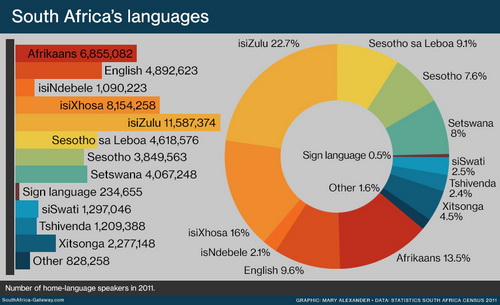![]()

Afrikaans scrapped at South Africa's University of Pretoria
The University of Pretoria told the BBC it needed to "transform the culture" to make it "truly South African".
Advertisement
English is the preferred language of instruction for many in South Africa.
Afrikaans language policy has historically been used to exclude black learners in a country where racism remains deeply embedded 25 years after white-minority rule ended.
The word apartheid, which has now been internationalised and is in the Oxford Dictionary, is in fact an Afrikaans word.
The language is still spoken by millions, but it is hoped that this move will make the many more millions who do not speak it feel welcomed in one of the best academic institutions in the country.
Alienating
Black and non-Afrikaans-speaking students on Twitter have been discussing the new policy, with many sharing the humiliating and alienating treatment they say they were subjected to at the University of Pretoria.
One said that black students were intentionally humiliated by Afrikaans-speaking lecturers.
Another remembers the language being a struggle for them as a black 17-year-old teenager from a township.
And another former student said lecturers refused to speak English, telling students: "If you don't understand that's not my problem."
When asked about these testimonies, the University of Pretoria's spokesman Rikus Delport told the BBC: "I'm sure there are incidents of that happening.
"That's what led to the whole coming together, and saying 'let's decide how we go forward'. It flowed from that."
Towards multilingualism
South Africa has 11 official languages - Zulu, Xhosa, Afrikaans, Sepedi, Setswana, English, Sesotho, Xitsonga, Siswati, Tshivenda and Ndebele.
Their constitutional recognition came with the advent of democracy, in an attempt to help end institutional racism and heal South Africa's bitter historical divisions.
"In an ideal world we would like all languages to have equal status in teaching, but it's not practically possible or feasible, so not a lot happens in other languages," the University of Pretoria's spokesman told the BBC.
"The university will still encourage multilingualism. We'll offer support services to students in their enrolment - where practically possible - in their home language."
Graduations and other official ceremonies will continue to feature the three languages already in use for those occasions - English, Afrikaans and Sepedi.
Credit: The BBC




